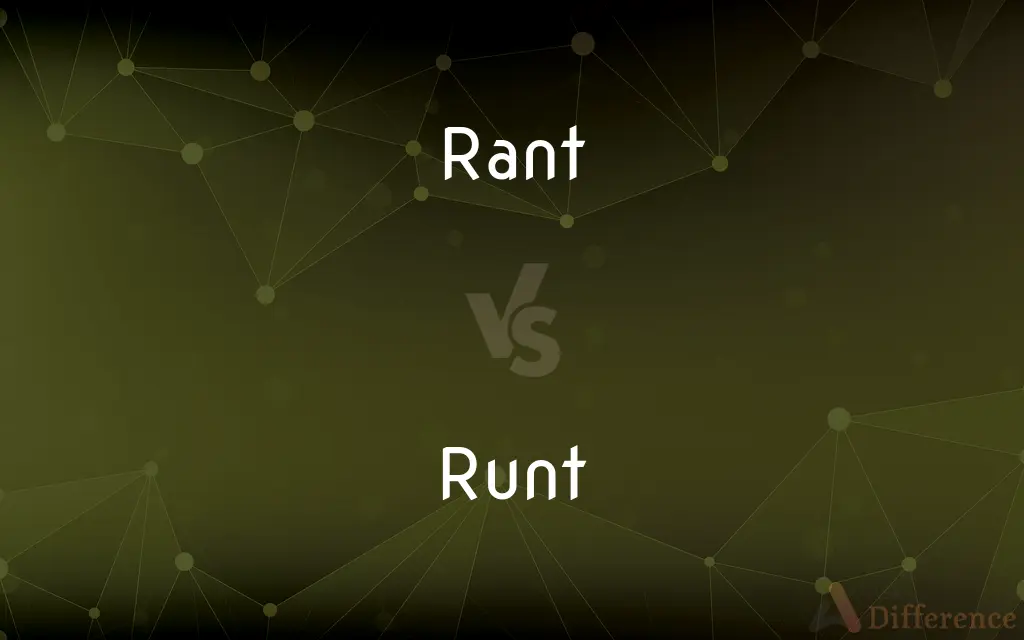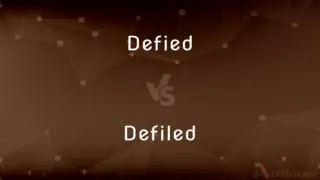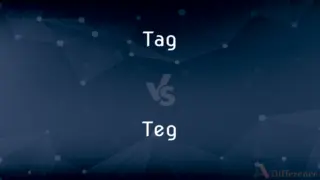Rant vs. Runt — What's the Difference?
By Maham Liaqat & Urooj Arif — Updated on April 23, 2024
A rant is a long, passionate, and often loud speech or complaint, while a runt is the smallest or weakest member of a litter, typically receiving less nourishment.

Difference Between Rant and Runt
Table of Contents
ADVERTISEMENT
Key Differences
Rant involves expressing strong emotions or opinions in a loud, often lengthy, and sometimes aggressive manner. It's usually a verbal outburst that can occur in various contexts, such as personal discussions, public speeches, or written posts on social media, where the speaker vents their frustrations or dissatisfaction about a particular subject. Conversely, runt refers to the smallest or least developed offspring in a litter of animals. This term can apply to various animal species and is often used in agriculture and pet breeding to identify the weakest or smallest animal, which might require special care due to its size and vulnerability.
While a rant is an act of communication characterized by its intensity and often critical nature, aiming to express strong feelings or critique something, a runt's distinction lies in its physical characteristics and status within its sibling group. The concept of a runt involves biological and ecological considerations, focusing on the animal's size, health, and developmental prospects compared to its littermates.
The motivations behind a rant can vary widely, from personal grievances and political dissatisfaction to cultural critiques and beyond. Rants are subjective expressions influenced by the individual's perspectives, emotions, and experiences. In contrast, the identification of a runt is a more objective assessment based on physical measurements and health indicators, although the care and attention given to runts can also be influenced by human perceptions and values.
The societal reception of a rant can vary, with audiences sometimes finding them cathartic or persuasive, while at other times, they may be viewed as excessive or unproductive. The perception of runts, however, has evolved, with many people now showing a particular affection towards them, often rooting for their survival and success due to perceived underdog status.
The primary difference between the two terms lies in their realms of application: rant is related to communication and expression, often loaded with emotion and opinion, while runt pertains to the physical realm, specifically the size and health of an animal relative to its siblings.
ADVERTISEMENT
Comparison Chart
Definition
A long, passionate speech or complaint
The smallest or weakest member of a litter
Context
Communication, expression of opinions or emotions
Biology, animal breeding
Characteristics
Emotional, often loud, critical
Physically small or underdeveloped, vulnerable
Purpose/Outcome
To express dissatisfaction, critique, or strong feelings
Identified for special care or attention due to size
Perception
Can be cathartic or seen as excessive
Often viewed with sympathy or as underdogs
Compare with Definitions
Rant
A loud, passionate outburst of complaint.
He went on a rant about the inefficiency of the city's traffic system.
Runt
The smallest animal in a litter.
The runt of the litter was also the most energetic.
Rant
Expressing strong criticisms or emotions verbally.
Her rant on social media about the policy changes went viral.
Runt
A term for an animal that is noticeably smaller or weaker.
Despite being the runt, the puppy eventually grew healthy and strong.
Rant
A long, emphatic speech expressing dissatisfaction.
The director's rant against the critics overshadowed the movie premiere.
Runt
Often receiving less nourishment due to size.
The runt struggled for food among its bigger siblings.
Rant
A passionate declaration of opinions.
His rant about environmental neglect inspired others to take action.
Runt
Identified for needing special care.
She adopted the runt, giving it the extra attention it needed.
Rant
An intense critique or venting session.
The customer's rant about the service received was heard throughout the store.
Runt
Symbolizing resilience or an underdog status.
The runt proved its mettle by overcoming its initial disadvantages.
Rant
To speak or write in an angry or emotionally charged manner; rave.
Runt
In a group of animals (usually a litter of animals born in multiple births), a runt is a member which is significantly smaller or weaker than the others. Owing to its small size, a runt in a litter faces obvious disadvantage, including difficulties in competing with its siblings for survival and possible rejection by its mother.
Rant
To express at length a complaint or negative opinion
"He could rant on the subject of physician-assisted illness" (Paul Theroux).
Runt
An undersized animal, especially the smallest animal of a litter.
Rant
To utter or express by ranting
"Adams's fellow Federalists ranted that he was mentally unfit to be president" (Susan Dunn).
Runt
(Derogatory) A short person.
Rant
Angry, emotionally charged, or tediously negative speech or writing
A speech that was more rant than reason.
Runt
The smallest animal of a litter.
Rant
An example of such speech or writing
A rant against the university's policies.
Runt
(by extension) The smallest child in the family.
The runt of the family
Rant
Chiefly British Wild or uproarious merriment.
Runt
Undersized or stunted plant, animal or person.
Rant
To speak or shout at length in uncontrollable anger.
Runt
(slang) An uninfluential or unimportant person; a nobody.
Rant
To disseminate one's own opinions in a - typically - one-sided, strong manner.
Harry was ranting about his boss again, but nobody paid any attention.
Runt
(networking) An Ethernet packet that does not meet the medium's minimum packet size of 64 bytes.
Rant
To criticize by ranting.
Runt
(typography) A single word (or portion of a hyphenated word) that appears as the last line of a paragraph.
Rant
(dated) To speak extravagantly, as in merriment.
Runt
A breed of pigeon related to the carrier pigeon.
Rant
To dance rant steps.
Runt
A hardened stem or stalk of a plant.
Rant
A criticism done by ranting.
Runt
A bow.
Rant
A wild, emotional, and sometimes incoherent articulation.
Runt
Any animal which is unusually small, as compared with others of its kind; - applied particularly to domestic animals.
Rant
A type of dance step usually performed in clogs, and particularly (but not exclusively) associated with the English North West Morris tradition. The rant step consists of alternately bringing one foot across and in front of the other and striking the ground, with the other foot making a little hop.
Runt
A variety of domestic pigeon, related to the barb and carrier.
Rant
To rave in violent, high-sounding, or extravagant language, without dignity of thought; to be noisy, boisterous, and bombastic in talk or declamation; as, a ranting preacher.
Look where my ranting host of the Garter comes!
Runt
A dwarf; also, a mean, despicable, boorish person; - used opprobriously.
Before I buy a bargain of such runts,I'll buy a college for bears, and live among 'em.
Rant
High-sounding language, without importance or dignity of thought; boisterous, empty declamation; bombast; as, the rant of fanatics.
This is a stoical rant, without any foundation in the nature of man or reason of things.
Runt
The dead stump of a tree; also, the stem of a plant.
Neither young poles nor old runts are durable.
Rant
A loud bombastic declamation expressed with strong emotion
Runt
Disparaging terms for small people
Rant
Pompous or pretentious talk or writing
Rant
Talk in a noisy, excited, or declamatory manner
Common Curiosities
Can a runt catch up in size to its siblings?
With proper care and nutrition, runts can sometimes catch up to their siblings in size and health, though they may remain smaller.
Do rants have any positive outcomes?
Rants can provide catharsis for the speaker and sometimes bring attention to overlooked issues, potentially leading to change or sparking discussions.
Are rants always negative?
While rants are often critical or express dissatisfaction, they can also passionately advocate for something positively, though the term usually implies negativity.
Is being a runt a permanent condition?
Being the runt refers to the animal's initial status at birth. With care, many runts grow up to be healthy, normal-sized adults.
Can humans be considered runts?
While "runt" is primarily used for animals, it can colloquially describe the smallest or least favored member in a group, though it's less common and can be seen as derogatory.
How can you identify a runt?
A runt is identified by its smaller size and weaker condition compared to its siblings in a litter, often requiring additional care.
How do people react to rants?
Reactions to rants vary widely, from agreement and support to discomfort or disagreement, depending on the topic and the audience's perspectives.
Why do some people prefer adopting runts?
Many are drawn to runts for their perceived vulnerability and resilience, wanting to provide them with a chance to thrive.
What triggers a rant?
A rant is typically triggered by strong emotions or opinions about a particular issue, leading to an impassioned expression of dissatisfaction or critique.
Can a rant be constructive?
Yes, if delivered thoughtfully, a rant can highlight significant issues and motivate constructive dialogue or action, though it often depends on the approach and context.
Share Your Discovery

Previous Comparison
Defied vs. Defiled
Next Comparison
Tag vs. TegAuthor Spotlight
Written by
Maham LiaqatCo-written by
Urooj ArifUrooj is a skilled content writer at Ask Difference, known for her exceptional ability to simplify complex topics into engaging and informative content. With a passion for research and a flair for clear, concise writing, she consistently delivers articles that resonate with our diverse audience.
















































